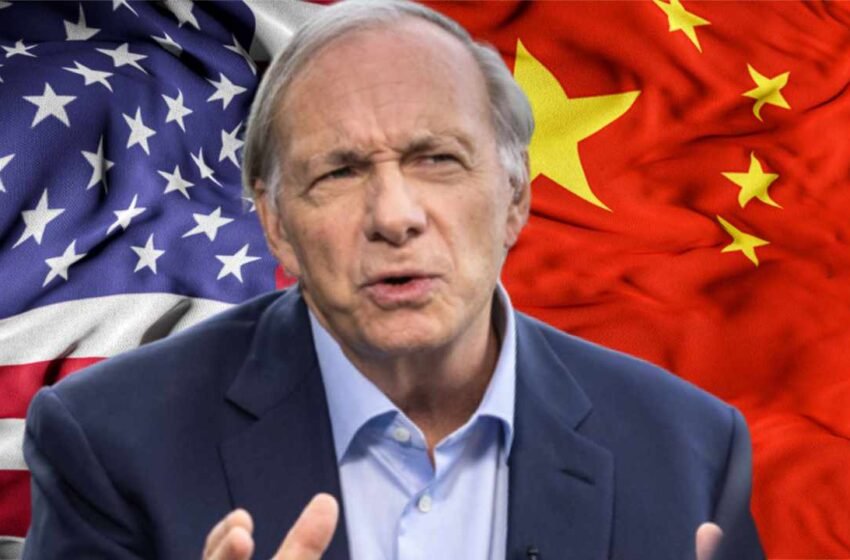Billionaire Ray Dalio Warns US and China on Brink of War, Beyond Ability to Talk — US-China Trade Could Collapse – Economics Bitcoin News
(Originally posted on : Bitcoin News )
Bridgewater Associates founder Ray Dalio has warned that the U.S. and China are “on the brink of war” and “are beyond the ability to talk.” The billionaire added that their relations “are getting so bad” that U.S.-China trade could collapse. He cautioned that the next 18 months “will be a very risky period.”
U.S. and China on the Brink of War, Says Dalio
Ray Dalio, the founder of the world’s largest asset manager, Bridgewater Associates, warned in a Linkedin post, published Wednesday, that the U.S. and China are on the brink of war. The billionaire, who has visited China for almost 40 years and has built close friendships there, shared his perspectives from his recent 13-day trips to China, as well as from meetings with Chinese citizens, experts on China residing outside the country, and policymakers in other countries, including the U.S.
Regarding U.S.-China relations, Dalio stressed:
The United States and China are on the brink of war and are beyond the ability to talk.
He noted that the two nations appear to be “close to having a sanctions war and/or military war that neither side wants.”
Dalio clarified: “I want to emphasize that by saying that they are on the brink, I don’t mean to say that they will necessarily go over the brink. I mean to say that they are very close to crossing red lines that, if crossed, will irrevocably push them over the brink into some type of war that damages these two countries and causes damage to the world order in severe and irrevocable ways — like Russia’s invasion of Ukraine did for Russia and the world, just much bigger.”
Next 18 Months ‘Very Risky’ for China and U.S.
The Bridgewater Associates founder cautioned that the next 18 months will be very risky for China and the U.S. Noting that “The hawkish political influences in the United States will exert more pressure on the relationship over the next 18 months because of the emergence of the 2024 election season,” Dalio opined:
That will be a very risky period because China and the U.S. are now already on the brink of war.
“The political timetable of the election cycle between now and the 2024 elections in the United States and Taiwan will likely lead to more push-the-limit anti-Chinese brinksmanship from the U.S.,” he continued.
The billionaire founder of Bridgewater Associates added:
U.S.-China relations are getting so bad that there is reason to worry that anti-China sentiment could make doing business with China like doing business with Russia, which would lead U.S.-China trade to collapse.
“This would have similarly damaging economic consequences, though many times larger, severely hurting supply chains and trade. That would at a minimum cause severe economic consequences for the U.S., China, and the world and at a maximum could lead to military war,” he cautioned. “These conflicts are affecting most countries’ and multinational companies’ relations and how the world is operating in innumerable ways that are intensifying.”
Meanwhile, the U.S. Department of Defense revealed this week that it is focused on potential conflict with China. “We have a clear strategy that’s focused on China,” the deputy secretary of defense told Bloomberg. “Our focus is making sure that the PRC [People’s Republic of China] leadership wakes up every day and says, ‘Today is not the day to undertake aggression that threatens U.S. interests’ … That’s our focus today, in 2027, and in 2035 and 2045.”
What do you think about billionaire Ray Dalio’s warning? Do you think the U.S. and China will go to war? Let us know in the comments section below.
Image Credits: Shutterstock, Pixabay, Wiki Commons
Disclaimer: This article is for informational purposes only. It is not a direct offer or solicitation of an offer to buy or sell, or a recommendation or endorsement of any products, services, or companies. Bitcoin.com does not provide investment, tax, legal, or accounting advice. Neither the company nor the author is responsible, directly or indirectly, for any damage or loss caused or alleged to be caused by or in connection with the use of or reliance on any content, goods or services mentioned in this article.







 Bitcoin
Bitcoin  Ethereum
Ethereum  Tether
Tether  XRP
XRP  Wrapped SOL
Wrapped SOL  USDC
USDC  Lido Staked Ether
Lido Staked Ether  Dogecoin
Dogecoin  TRON
TRON  Cardano
Cardano  Wrapped stETH
Wrapped stETH  Wrapped Bitcoin
Wrapped Bitcoin  Figure Heloc
Figure Heloc  Hyperliquid
Hyperliquid  Chainlink
Chainlink  Bitcoin Cash
Bitcoin Cash  Wrapped eETH
Wrapped eETH  Stellar
Stellar  Ethena USDe
Ethena USDe  Sui
Sui  USDS
USDS  Binance Bridged USDT (BNB Smart Chain)
Binance Bridged USDT (BNB Smart Chain)  WETH
WETH  LEO Token
LEO Token  Hedera
Hedera  Avalanche
Avalanche  Coinbase Wrapped BTC
Coinbase Wrapped BTC  Litecoin
Litecoin  USDT0
USDT0  Monero
Monero  WhiteBIT Coin
WhiteBIT Coin  Shiba Inu
Shiba Inu  Toncoin
Toncoin  Zcash
Zcash  Cronos
Cronos  Mantle
Mantle  Ethena Staked USDe
Ethena Staked USDe  Polkadot
Polkadot  Dai
Dai  World Liberty Financial
World Liberty Financial  Bittensor
Bittensor  MemeCore
MemeCore  Uniswap
Uniswap  Aave
Aave  OKB
OKB  sUSDS
sUSDS  Bitget Token
Bitget Token  Ethena
Ethena  USD1
USD1  Pepe
Pepe  NEAR Protocol
NEAR Protocol  BlackRock USD Institutional Digital Liquidity Fund
BlackRock USD Institutional Digital Liquidity Fund  PayPal USD
PayPal USD  Jito Staked SOL
Jito Staked SOL  Ethereum Classic
Ethereum Classic  Aptos
Aptos  Binance-Peg WETH
Binance-Peg WETH  Ondo
Ondo  Jupiter Perpetuals Liquidity Provider Token
Jupiter Perpetuals Liquidity Provider Token  Pi Network
Pi Network  Aster
Aster  Falcon USD
Falcon USD  Tether Gold
Tether Gold  POL (ex-MATIC)
POL (ex-MATIC)  Worldcoin
Worldcoin  USDtb
USDtb  Rocket Pool ETH
Rocket Pool ETH  Arbitrum
Arbitrum  KuCoin
KuCoin  Pump.fun
Pump.fun  Gate
Gate  HTX DAO
HTX DAO  Binance Staked SOL
Binance Staked SOL  Kinetiq Staked HYPE
Kinetiq Staked HYPE  Internet Computer
Internet Computer  Algorand
Algorand  Story
Story  Official Trump
Official Trump  StakeWise Staked ETH
StakeWise Staked ETH  Cosmos Hub
Cosmos Hub  VeChain
VeChain  Liquid Staked ETH
Liquid Staked ETH  Wrapped BNB
Wrapped BNB  Sky
Sky  Jupiter
Jupiter  Lombard Staked BTC
Lombard Staked BTC  Syrup USDC
Syrup USDC  PAX Gold
PAX Gold  BFUSD
BFUSD  Pudgy Penguins
Pudgy Penguins  Renzo Restaked ETH
Renzo Restaked ETH  syrupUSDT
syrupUSDT  Render
Render  Sei
Sei